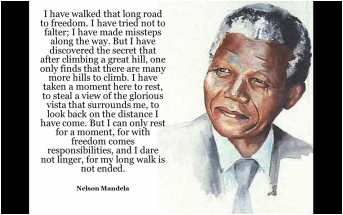
To take the inevitable flaws of a living being and to bleach them out of existence until all you are left with is an empty cipher, a blank page on which others may project their own desires and aspirations, is the worst way to celebrate their lives. It has seen many of those giving public eulogies to this undeniably significant political figure internalise and end up speaking about their own lives and achievements; the subject of their perorations reduced to a catalyst for their own political awakening.
Mandela participated in several important decision points in South Africa’s history. The Defiance campaign, the rejection of Ghandi inspired non-violent protest for armed struggle and the unification of black and white citizens into a single vision of the Rainbow nation, defusing the potential post-apartheid flashpoints through the Truth and Reconciliation process.
They were important decisions taken at crucial moments, but they were not taken by he alone and they were not without their unintended consequences. On the whole the story of those decisions and their timing are largely to the credit of those involved. But human frailty and the concept of what is or is not a legitimate military target and what is acceptable will always play its part. The ‘hard targets’ of the ANC’s bombing campaign by the military wing Umkhonto we Sizwe and the appalling abuses at the Quadro punishment camp in Angola inevitably attracted high levels of criticism even within the ANC. There was no such self-flagellation in the regime after the assassinations of Ruth First and the murder of Steve Biko.
As with most of the anti-apartheid warriors, it was their families who bore the brunt of the sacrifices made to the cause. Children without parents, or worse, parents who had no time to be parents, slaves to a struggle that outranked the needs of their loved ones. Mandela paid that price along with the others and it is reflected across the world amongst the fractured, traumatised and damaged families of those who stayed and were imprisoned and those forced into exile, forced to prioritise the struggle for freedom over the joys of hearth and home.
The ANC were well aware of the usefulness of Mandela as a symbol and helped to foster a personality cult that would prove absolutely vital in quelling the tensions of the post-apartheid era. This is not to deny his own implacable resistance to many of the offers put to him by successive Nationalist governments and his later shepherding of those first few steps to freedom. He refused offers of release in return for concessions and silence and when he was ill with tuberculosis and the Government feared the consequences of his death, he could have accepted the tainted offers and walked out of Pollsmoor Prison knowing that he had accepted serious compromises that would throw the country and the ANC into chaos. That courage and commitment is worth celebrating, but the legacy of an administration that still wrestles with corruption and the failure to raise the majority from township to genuine equality of opportunity, is a reflection of the chasm between political aspiration and achievement in Mandela, the leadership at large and indeed in all political struggles.
Ironically, it was that racist bugbear Enoch Powell, writing about Joseph Chamberlain, who observed ‘"All political lives, unless they are cut off in midstream at a happy juncture, end in failure, because that is the nature of politics and of human affairs." But these human failures to completely bridge the gap between dream and reality in countries radically altered in recent years like Northern Ireland, Russia and South Africa are noble failures. They went further than they thought they could and fell short because their aspirations were higher than those around them. But the bridges are still under construction and the other side is always in sight of the next generation, if they care to see it and continue to build towards it.
 RSS Feed
RSS Feed